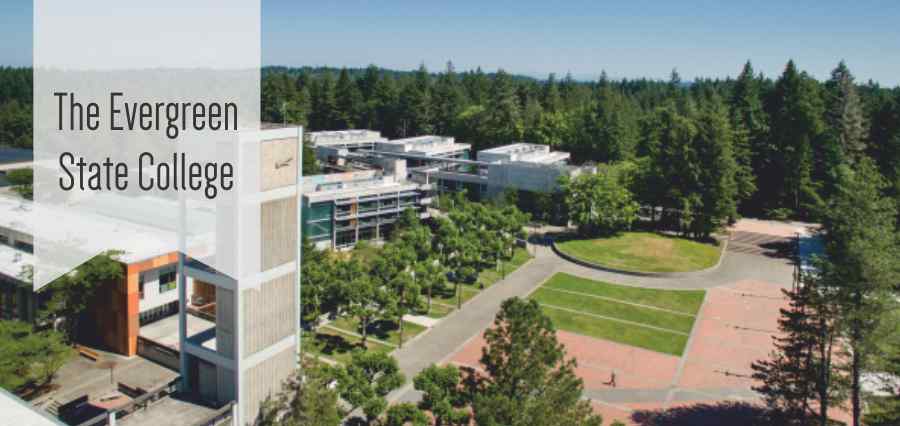As an innovative public liberal arts college, Evergreen emphasizes collaborative, interdisciplinary learning across significant differences. Their academic community engages students in defining and thinking critically about learning. Evergreen supports and benefits from local and global commitment to social justice, diversity, environmental stewardship and service in the public interest.
In this fast-paced era, as we face the prosperities and adversities of both globalization and a knowledge-based economy, scientific and technological innovations have become increasingly important. To succeed in this new information-based and highly technological society, students need to develop their competences in STEM to echelons much beyond what was considered acceptable in the past. The Evergreen State College’s math and science programs emphasizes on student learning supported by dedicated faculty and staff and access to cutting edge scientific practices and modern pedagogy.
Set amid a serene Pacific Northwest forest, The Evergreen State College is a progressive, public arts and sciences college in Olympia, Washington. From sustainability to social justice, Evergreen’s curriculum focuses on real-life problems, themes, and experiences. Some of the undergraduate courses in the STEM fields offered at Evergreen in 2017-18: Earth and Sky: Climate and Change; Student-Originated Software; Computation and Consciousness; Atoms, Molecules, and Reactions: Inorganic Chemistry; Northwest Forests: Biogeochemistry and Management; Business, Biology, and Sustainable Solutions; Bryophytes and Lichens of the Pacific Northwest; Advocating for a Sustainable Future: Weaving Stories and Statistics. Evergreen also has three prominent graduate programs: Master in Teaching, Master of Public Administration and Master of Environmental Studies.
Evergreen students choose from an impressive array of interdisciplinary programs and plan their path to a bachelor’s degree and area of emphasis. Narrative evaluations replace grades and provide students with meaningful feedback that future employers and graduate schools can review to learn more about students’ accomplishments.
The Evergreen State College: Go Beyond the Ordinary and Experience Your Education the Way You Imagine
- Institutional commitments to interdisciplinary learning, collaborative learning across significant differences, and connecting theory to practice mirror the communities of practice that students will encounter in scientific work after they graduate.
- As a student, you can mix a variety of interests and develop your own area of emphasis based on your unique goals. Evergreen offers programs and courses in more than 60 fields of study.
- Through individual and group projects in classrooms, computer labs, dry labs, wet labs, and the field, and through faculty-guided undergraduate research, student learn technical and 21st century skills including critical thinking, collaboration, and communication as they integrate knowledge across disciplines to tackle real-world problems in all their complexity.
- The main library on the College campus is the Daniel J. Evans Library, named after the former governor that signed the legislation that founded Evergreen, and was also the school’s second president. The library is home to some 428,000 volumes and 750,000 print and media items overall.
- Evergreen’s grounds and facilities are managed to minimize environmental hazards through resource conservation, low-impact cleaning and maintenance, native landscaping, stormwater runoff reduction measures, and LEED certification for new and renovated buildings.
- One of the LEED buildings, The Longhouse, is the first building of its kind on any U.S. College or university campus. The Longhouse is home to Evergreen’s tribal programs and is a world-renowned gathering space for indigenous artists.
- The annual Science Carnival on campus allows Evergreen students to showcase their research and projects to the wider community, including 750 students from surrounding elementary and middle schools.
- Evergreen is among the top colleges in the U.S. for offering the best first-year experiences to freshmen, which entails building into the curriculum first-year seminars or other programs that bring small groups of students together with faculty and staff on a regular basis.
Glorious Greeners of the Evergreen College
Evergreen is notable for having produced a number of graduates in fields including animation, comedy, and music. Recently, Byron Howard ’90 received an Oscar for co-directing the movie Zootopia, which is an animated feature that puts diversity on display. Among their most celebrated alumni are mycologist Paul Stamets, cartoonists Matt Groening, Craig Bartlett, and Lynda Barry, comedians Josh Blue and Michael Richards, musicians Macklemore, Carrie Brownstein, Corin Tucker, Kathleen Hanna, Tobi Vail, Conrad Keely, Tay Zonday, John Wozniak, and Martin Courtney, reality television stars John Taylor and Steve Thomas, writers Benjamin Hoff, Judith Moore, Tom Maddox and Wendy C. Ortiz.
Evergreen alumna Lynda Weinman founded the premier software and digital media training site, lynda.com, which she sold to LinkedIn for $1.5 billion. She is also a leading author on web design and graphics. Other notable alumni include peace activist and diarist Rachel Corrie, professional soccer players Shawn Medved and Joey Gjertsen, and United States Representative for Washington’s 10th congressional district Dennis Heck.
About A Percipient Articulator of Ornithology
Dr. Steven G Herman, a faculty emeritus at Evergreen, has taught Summer Ornithology: Birds in the Hand for over 35 years. Summer Ornithology is a three-week bird course taught entirely in the field in various locations throughout Oregon. The only prerequisites are enthusiasm for studies in natural history and a fascination with wildness in the American West.
Studies are built around banding hundreds of birds of about 25 species, focusing on aspects of banding protocol, including net placement, removing birds from nets, identification, sexing, ageing, and record-keeping. Steve encourages students to balance the in-hand work with field observations, and take local field trips to provide instruction in the myriad aspects of natural history and local culture in the High Desert of southeastern Oregon.
Herman has a PhD in Zoology and is a tireless mentor; training and inspiring beauty, connection, and natural history to promote applied conservation. He is also the co-author of “The Naturalist’s Field Journal: A Manual of Instruction Based on a System Established by Joseph Grinnell”









